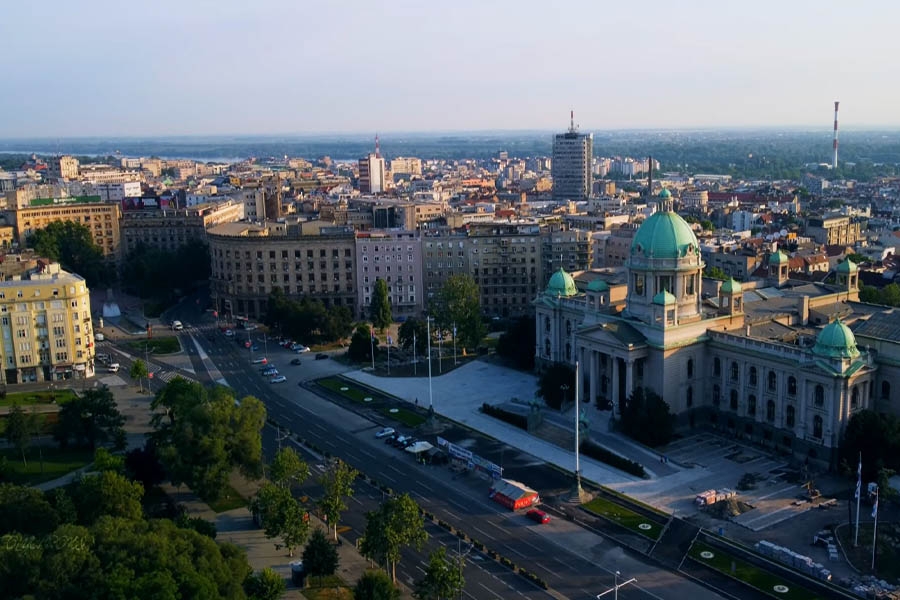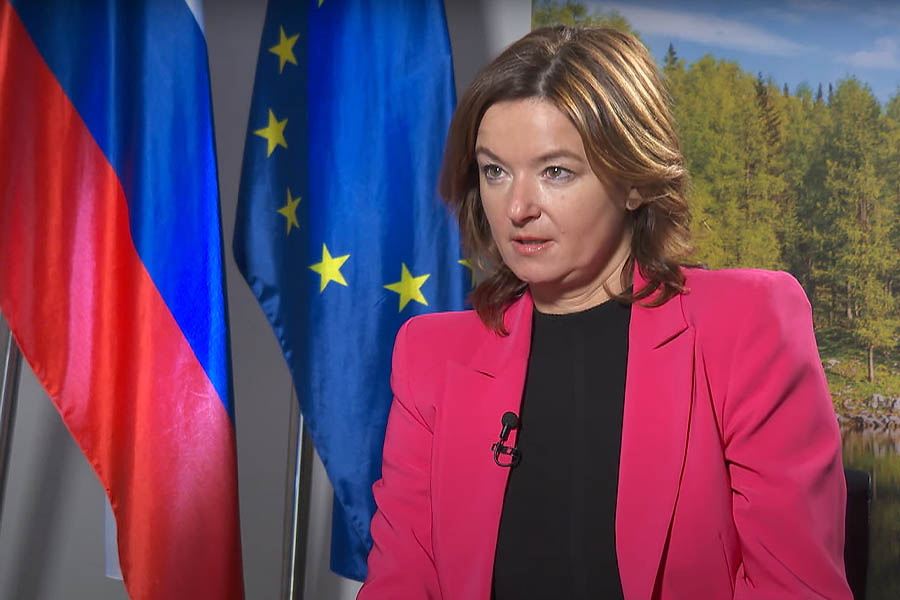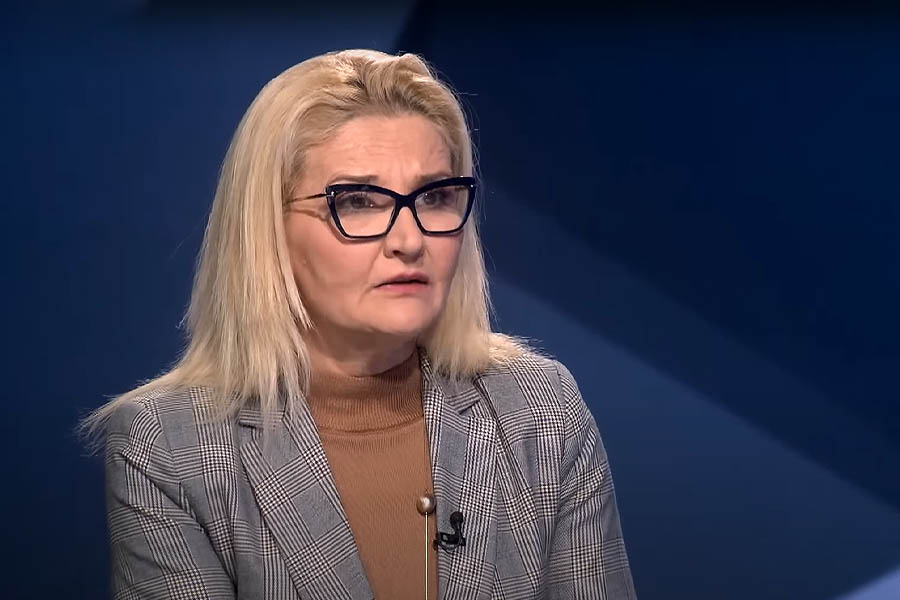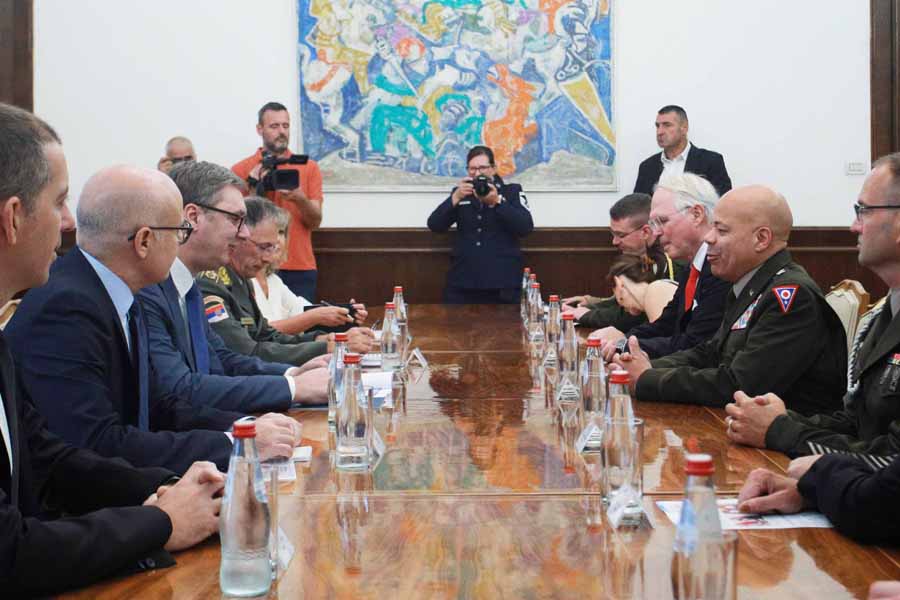Serbia has systematically undergone Seseljization and Putinization in the media-mental space and political discourse. The EU remains the formal and necessary main goal, but only to the extent required for the sustainable model of the radicals in these times.

Serbia has systematically undergone Seseljization and Putinization in the media-mental space and political discourse. The EU remains the formal and necessary main goal, but only to the extent required for the sustainable model of the radicals in these times.
In tourist brochures, it is mandatory to mention that when you come to Bled, you mustnt allow yourself to miss trying the famous Bled cream cakes, first crafted by the master pastry chef Istvan Lukacevic over half a century ago. In the late forties of the last century, he moved from Senta, in Vojvodina, to Bled with his family, and in 1953, as the head of the pastry shop in the old "Park" hotel, he invented the recipe for the now well-known cream cake. Unlike the Bled cream cake, which has an old recipe from the Vojvodina region, the Kotor cream cake, or "Kotor’s pashta" as its known among the locals in Kotor, is a sweet pie, a variation of the cream cake that is traditionally prepared in Kotor. It fundamentally differs from the traditional cream cake in that the Kotor cream cake is made with three layers instead of two layers like the ordinary (like the Bled cream cake). If the Bled cream cake originated from Vojvodina, in Kotor, they will tell you that Italians brought the recipe for their delicacy.
Well, cream cake does sound better than carrots, doesnt it? In the context of the old metaphor of the "carrot and stick," or rather the methodology with which the "collective West" engages with the Western Balkans, specifically with Serbs and the Serbian element in the region.
The political Bled cream cake, instead of carrots, logically made its premiere appearance in Bled at this years Bled Strategic Forum and comes down to the statement by the President of the European Council, Charles Michel, that the EU and the Western Balkans should be ready for enlargement by 2030.
This is worse than the "Juncker date" (Jean-Claude Juncker, President of the European Commission before Ursula von der Leyen), under which Serbia (together with Montenegro) could become an EU member in 2025. However, its still better than the "Mitsotakis date" (Kyriakos Mitsotakis, the current Prime Minister of Greece), which has Serbia as part of the EU in 2033, regardless of the fate of the rest of the Western Balkans. Back then, Juncker had still hedged his statement by saying that the date was not a promise but rather an "encouragement" for candidates. But now, Tanja Fajon, the Minister of Foreign Affairs of Slovenia, after the Bled Strategic Forum, is talking about the "Bled promise," not the "Bled encouragement," which is actually the real encouragement, assuming that the Slovenian minister did pay attention to linguistic nuances. At least thats whats written in Politika, the daily newspaper that published Tanja Fajons authored text, and her portfolio is precisely Minister of Foreign and European Affairs of Slovenia.

Foto: Printscreen Youtube (Al Jazeera Balkans)
Fajon emphasized that the so-called "Bled promise" left no one indifferent at the conference, hence the metaphor of the "Bled cream cake." But why, then, do we mention the Kotor cream cake? Well, because during the famous EU Summit in Thessaloniki in 2003, there was even talk of a "regatta" (package) led by Croatia, only to find out later that Thessaloniki had actually created the Summit solely for Croatia, even though the entire Western Balkans had been given a grand European membership perspective at that time. Today, Montenegro is a member of NATO, and given Serbias confusing foreign policy when it comes to long-term goals, its not impossible that there wont be a package with Montenegro tomorrow, which may become an EU member before Serbia, as Serbia may very well wait to become a member of BRICS. So, some "Brdo-Brijuni" meetings that took place this September in Skopje might be held tomorrow in Kotor, where Serbia (and whoever else remains with it in the Western Balkans) will receive the "Kotor promise" from that hypothetical summit or the "Kotor cream cake," but now with three layers instead of two.
In addition to the "Bled promise," the other key point in Tanja Fajons article is "full speed" - by 2030. More precisely, the EU enlargement by 2030 is an opportunity that should be seized at full speed.
The Declaration from the "Brdo-Brijuni" Summit that followed Bled ambitiously emphasizes that both the EU and the Western Balkans should be ready for enlargement as soon as possible, "but no later than 2030, in order to achieve this goal." Western Balkan leaders in Skopje committed to intensify strategic dialogue with EU institutions.
Todays Minister for European Integration in Vucics government, Tanja Miscevic, was the head of Serbias negotiation team with the EU in 2013. Without context, someone comparing the two periods over a decade might think theres continuity, even symbolically, in Serbias European efforts, given that Miscevic went from being the chief negotiator to becoming a minister.
However, this is an illusion because, over the past decade, Serbia has systematically become more Russified and has seen a shift in its media-mental space and political discourse towards a more Seselj-esque and Putin-esque direction. The EU remains the formal and necessary main goal, but its formal only to the extent necessary for the sustainable model of the radicals in these times.
The metaphor of "full speed" that Tanja Fajon writes about today was also used by Tanja Miscevic in Brussels in December 2013. Back then, Miscevic said that Serbia was ready to move at full speed into accession negotiations. The then-forgotten European Commissioner for Enlargement, Stefan Füle, encouraged Serbia. Official accession negotiations between Serbia and the EU began in January 2014.
Among the conference organizers in Brussels in December 2013, where "full speed" was also discussed, were the Konrad Adenauer Foundation and "MK Group," whose president, Miodrag Kostic, was also a participant. The Konrad Adenauer Foundation, close to the ruling Christian Democratic Union of Angela Merkel at the time, treated the Serbian Progressive Party as an ideologically close party. It was a time when Vucic didnt quote Leibniz but rather Weber. In the meantime, the accumulated Leibnizian "sufficient reasons" used for attacks on Vucic (as he presents it) have invalidated the "Protestant Ethic and the Spirit of Capitalism" that Vucic wanted to apply in Serbia. At that time, retirees, public enterprise employees, and the emerging lower middle class created over these ten years were not the layers (strata) of society that Vu?i? wanted to impress first.

Foto: Printscreen Youtube (Insajder)
In December 2013, Tanja Miscevic stated, "I feel like Im behind the wheel of a Ferrari with the engine running, just about to take off." She reminded everyone that Serbia had begun harmonizing its regulations with European standards over a decade ago, well before signing the Stabilization and Association Agreement. "So, were not starting from scratch," Miscevic emphasized, adding that the accession negotiation process would be inclusive, as the Serbian team was coordinating with representatives from civil society and the business sector. On the other hand, as he gained more power, Vucic increasingly emphasized that things were practically starting from scratch in 2012, even though all his reformist moves would have been impossible without the policies of the DOS (The Democratic Opposition of Serbia) coalition. After all, why would Vucic have taken on so many former DOS members if things had been so wrong?
Tanja Fajon, in her interview with Politika, explains that "the coming years will not deal with perceptions or deceptions." She emphasizes that both sides, the Western Balkans and the EU, will engage in hard work. She also mentions "political will." Membership of the Western Balkans in the EU by 2030, which is hoped for by the Skopje Declaration "Brdo-Brijuni," is, according to Vucic, "nice wishes." In his recognizable cynicism, he concludes, "But who am I to shatter the optimism of others and diminish the ambition of others, so my role was to accept – great if it turns out that way, but Im not sure if it will."
If Vucic had wanted to be even more cynical and realistic in Skopje regarding the "Bled cream cake" - EU 2030! he could have quoted the slogan of this years Belgrade Pride Parade - "Were not even close."
It is possible that the symbolic dissolution of the SFRY occurred as early as 1984 during the celebration of Thirteen Centuries of Christianity among Croats in Marija Bistrica, even though Pope John Paul II did not attend due to the condition set by the SFRYs leadership to visit the House of Flowers and Jasenovac Concentration Camp. Politically astute Croats already felt back then that Croatia would be part of the West tomorrow rather than the fading Titos Yugoslavia. Alternatively, the SFRY may have truly fallen apart when Zagreb and Belgrade argued over who would host the Eurovision Song Contest final after Zadars group "Riva" broke that psychological barrier and brought victory to the SFRY. As soon as Toto Cutugno won with "Insieme," a song about a united Europe, at the 1990 competition in Zagreb, Serbia quickly moved in the opposite direction. The recent death of Toto Cutugno was a timely occasion (perhaps even for Vucic) to remind ourselves of Serbias missed opportunities and mistakes that we can only mitigate but never rectify. With this realization, we should also assess Vucics reformist diligence and recurring radical-party cynicism.
The state union of Serbia and Montenegro symbolically dissolved, for sure, during the Eurovision Song Contest ("Flamingos" or "No Name"). Since then, it has been symbolically clear that Montenegro has adopted a clear pro-Western direction in its foreign policy.
If Serbia were to truly enter the EU by 2030, Vucic could not lead the country into it as the president (unless there was a dramatic change in the Constitution). He might be able to do so as the prime minister, which would likely require constitutional changes and perhaps even the formal adoption of a chancellor system, a system Vucic had informally introduced while he was prime minister. If the opposition were to defeat Vucic, could there be a "full speed" towards the EU, and would there be the "political will" for EU integration if todays pro-European opposition had to share power with an anti-Vucic, but also anti-European, pro-Putin right-wing? Would parts of the current government still be the optimal partners?
It may seem somewhat tragicomic when Vladimir Putins supporters in Serbia attack Vucic for trampling on democracy, just as liberals and leftists who criticize the West and NATO in Serbia can be seen as Putins useful idiots.
Support for the LGBTQ+ community is relatively unpopular among members and supporters of the ruling coalition, and Vucic is well aware of that. Hence, the need and obligation (due to ties with the EU and the US) to hold the Pride Parade in the media space are covered and neutralized by the pompous celebration of the promotion of young officers in the center of Belgrade on the same day, as well as the "Family Days" event organized in Perlez by the Ministry for Family Care and Demography and the City of Zrenjanin over the weekend when the Pride Parade takes place. A bolder policy would present the Pride Parade as the central event of the day, without events aimed at appeasing supporters that could be held on another day. This is why Tanja Miscevic, as the only representative of the government at the Pride Parade, appeared detached from the government she belongs to, which paradoxically has a gay prime minister. If one of the government officials present in Perlez (Milos Vucevic - president of the Serbian Progressive Party, Minister of Defense, Deputy Prime Minister, Danica Grujicic - Minister of Health, Zoran Gajic - Minister of Sports, Darija Kisic - Minister for Family Care and Demography) had attended the Pride Parade (or if they had all attended together), then Serbias European orientation would have been more convincing. At least the intention to move "at full speed" toward that goal, no matter how much someone might consider attending the Pride Parade on behalf of the state as a necessary evil and a work obligation. Perhaps, through media conditioning, even supporters of the government would understand that this is what must be done for higher interests. As it is now, its noticeably emphasized in the media how many ministers were in Perlez, making it appear that Tanja Miscevic went "there" because someone had to. The Ministry of European Integration was supposedly responsible for the mentioned event.
Undeniably, one of Vucics significant achievements is maintaining the valid dilemma of whom the President of Serbia is deceiving more – the pro-European or pro-Russian option in Serbia.
The system of mutually functional paradoxes presented as a media perpetuum mobile continues to operate. At a meeting on September 7th with Ohio National Guard Commander Major General John Harris, Vucic emphasized that Serbia is committed to strengthening overall relations with the United States. However, pro-Putin journalist Ljubinka Milincic almost suggests that the Serbian people wont forgive the pro-Western opposition for this, that it is not logical to promote NATO in a country that NATO bombed, and at the same time, she succeeds in leaving the media impression among many anti-Western analysts that it is not referred to Vucic when its said.

BETAPHOTO/MILOS MISKOV
This statement highlights how Vucic has managed to maintain a delicate balance in Serbian politics, oscillating between the pro-European and pro-Russian options. He uses these contradictions to his advantage, allowing him to appeal to a broad spectrum of voters while keeping his grip on power. Its a strategy that has allowed him to maintain control and navigate the complex political landscape in Serbia.
Realistically, the Russians dont have a more reliable and serious partner in Serbia than Vucic, even in his conditionally Westernized state, but still principled regarding the promise made to the Russians in 2019 – "Never again 48." Even the "collective West" is not primarily concerned with whether Vucics regime can reform; what matters is whether it can make strategic concessions and agreements. It cant do the former, but it can do the latter. While it may still be challenging to expect "Voice of America" to be broadcast on Hepi TV, it wouldnt be surprising if it happened on Pink TV. Sometimes, it truly creates the impression in the media that Christopher Hill is the President of Serbia and Aleksandar Vucic is the Prime Minister. With the caveat that Hill exceeds his authority if you only see him as an ambassador of a foreign country, but if you see him as the "President" of Serbia, as some malicious critics of Vu?i? from the right like to point out, it seems like hes wielding authority. He emphasizes Serbias general policy while Vucic runs the executive branch.
In informed circles, its heard that the United States has opted for "strategic patience" regarding Serbia. This still provides some maneuvering space for Vucic, even though the image is created that everything is happening hastily while dancing risk-averse on the razors edge.
In all societies there are issues that are rather being skipped. Certain...
The neoliberal path, started in 2001, has led to especially bad results in Serbi...
For centuries, the region was subsumed within the Ottoman and Hungarian Empires,...
"Serbia has returned to the systemic and anti-systemic position of the political...
In reality, Serbia is closer than ever to NATO. In the course of the last five y...